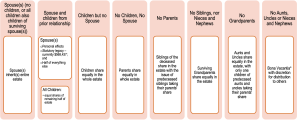Up to 60% of Australians do not have a will. So, what happens if you pass away without a will? In all States and Territories in Australia there are slightly different intestacy rules which set out what happens to your estate without a will.
The person entitled to an estate are set out below. To move from one category to the next, you must show there is no one who fulfils an earlier category. This is known as ‘clearing of’.
Certificate evidence is required to ‘clear off’ each category. The death certificate of the deceased is not sufficient evidence to prove spouses and parentage. If you were not married to your spouse, which given the declining marriage rate is becoming more common, your spouse will need to put on affidavit evidence that they were your spouse and that you also left no other spouse. It is possible to leave more than one surviving spouse.
If you leave no one in the any of the above categories, your estate will pass to the Government, known as bona vacantia, however an application may be made by the Minister to waive the State’s right to the estate in favour of dependents, those with a moral claim, or an organisation that the deceased may have been reasonably expected to make provision for.
Whilst the rules are clear cut in NSW about who receives what, there is a lot more evidence required to establish who is entitled to your estate and it may not cater for your wishes, particularly considering the increased numbers of blended families. Having a will prepared ensures that your wishes are known and can be followed as far as practicable by those you have left behind without any additional and avoidable burdens.
This post focuses on NSW intestacy laws and the laws on intestacy vary amongst the States and Territories in Australia.
Contact on our estate planning lawyers today to get your will in place to save your loved ones time and money when you pass away.
By Kate Donnan
More on Wills and Estate Planning
Get started and save time and money with de Groots secure online Estate Planning assistant.




